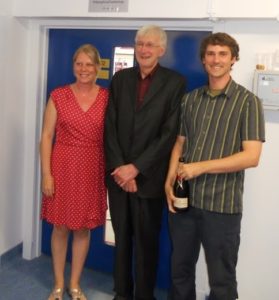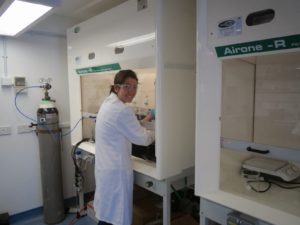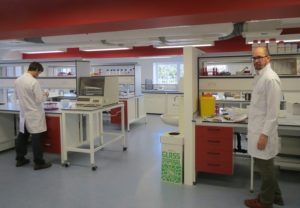New lab to unravel the mysteries of Earth and life
 On Thursday July 17th, Drs Aubrey Zerkle and Mark Claire held a grand opening for their new geobiology laboratory space in the Bute building. Approximately 40 members of staff from the Department of Earth and Environmental Sciences were in attendance, as the laboratory was formally christened the “Peter James Clark Centre for Philosophical Geobiology”.
On Thursday July 17th, Drs Aubrey Zerkle and Mark Claire held a grand opening for their new geobiology laboratory space in the Bute building. Approximately 40 members of staff from the Department of Earth and Environmental Sciences were in attendance, as the laboratory was formally christened the “Peter James Clark Centre for Philosophical Geobiology”.
The interdisciplinary laboratory will be dedicated to studying the links between geochemistry and biology over Earth history, as evidenced in modern environments and recorded in the rock record.
In just two weeks’ time, the lab already has in excess of 15 occupants, including post-doctoral researcher Gareth Izon and PhD student Colin Mettam, who are working with the PIs on a NERC-funded project to unravel the interplay between biological forcing and atmospheric chemistry recorded in 2.5 billion year old sediments from South Africa and Western Australia.
It is also supporting a host of undergraduate researchers starting dissertation projects and summer internships on a wide range of cross-disciplinary projects, including:
- geochemistry of Mars analog soils from the Atacama desert (Chile),
- sulfur cycling in Earth’s oldest well-preserved microbial mats,
- nutrient cycling in redox-stratified Lake Kinnert (Israel), and
- paleoenvironmental characterization of the world’s first phosphorite deposits. Exciting stuff!


The somewhat whimsical name for the lab was chosen to honour Professor Peter Clark, retired Professor of Philosophy and member of the Principal’s office, whose efforts were instrumental in pushing the long-awaited project forward. “We will attempt to learn from the philosophers by always asking ourselves and our students to contemplate the larger meaning of our scientific results,” said Co-PI Dr Mark Claire upon unveiling the plaque above the door. Dr Tony Prave, Reader in Earth Sciences and Director of Research for the department was also recognized during the short ceremony for his continued support and inspiration.